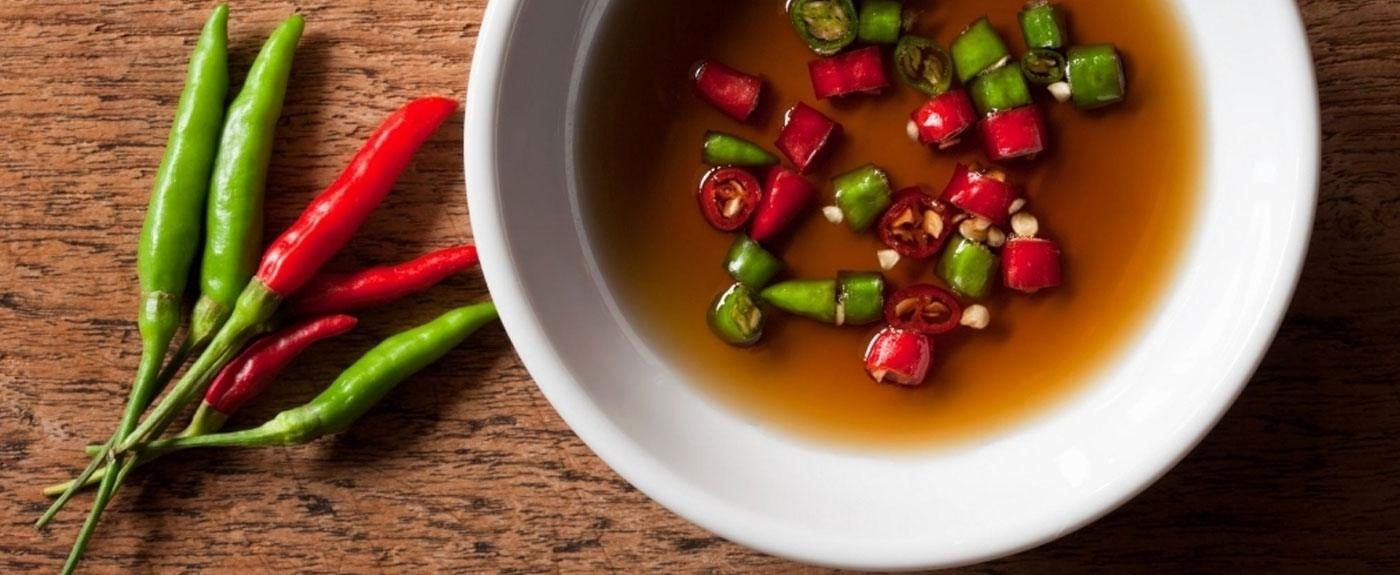Vietnamese fish sauce is the secret behind the delicious taste and typical flavor of many Vietnamese dishes.
Fresh spring rolls can’t be complete without a bowl of fish sauce. Pho has its reputation all over the world partly thanks to the great contribution of this sauce.
Contrasting with its amazing taste, fish sauce smell caused a lot of arguments around it. For many of my international friends, the aroma of fish sauce is a disaster. “I love fish sauce but I hate the smell” I’ve heard very often.
If you have the same love-hate relationship towards Vietnamese fish sauce, would you keep loving it or giving it up for good?
Before making any decision on that, allow AMA Vietnam to tell you the story behind Vietnamese fish sauce first.
How is the Vietnamese fish sauce made?

To begin with, it’s important to know the production process of fish sauce. Because it’s the reason why it has such a strong smell.
In fact, Vietnamese fish sauce is an amazing gift from the ocean. It is a combination of pure salt and fresh fish. With a touch of skillful humans, it comes to the kitchen with great taste as well as an unique and typical smell.
To have a good drop of fish sauce, we have to go through many complex steps. Every single step can impact the taste of fish sauce at the end. So it requires a lot of concentration and professional skills to produce it.
Different regions in Vietnam have their own ways for producing fish sauce. There are nowadays 4 main methods to do so :
- Sun exposure and stirring
- Compression
- Mixed (compression – sun exposure – stirring)
- Sealed drying
According to the compression method, fresh fish, after being pulled ashore, will be washed and mixed with salt with a weight ratio of 3:1 (e.g : 1kg of salt for 3kg of fish)
Then they will be carefully compressed in sealed barrels. This method relies on yeast in fish to break down the protein of fish meat, completely without water and without stirring the barrel.
About 1 to 2 years later, when the color of the fish sauce changes from light yellow to completely dark yellow with the natural aroma, it is fully cooked and ready to be served.
As it’s a fermented process of fish and salt under a pressed and hot conditions for a long time, the fish sauce smell becomes strong.
So Vietnamese fish sauce just smells strong, it’s not stinky at all? Well if you are asking yourself this question now, keep reading. The answer is just right below 🙂
Does the smell of Vietnamese fish sauce really stink?

Following the production process mentioned above, it cannot be denied that the fish sauce smell is very strong. However, the real Vietnamese fish sauce does not stink at all. On the contrary, it has a great aroma and is completely unique.
Whether we eat it directly as a dipping sauce or use it to cook as a condiment, its taste and its smell always get credit.
However, some commercial brands are using anchovy extract to produce the fish sauce for more profitable purposes, as it’s much cheaper to produce. These artificial flavors make the Vietnamese fish sauce smell very stinky.
Especially when we use this type of fish sauce for cooking, the smell could overwhelm and take over all aroma of your food. This heavy smell also creeps through every corner of your home and keeps its presence for a while.
That is the reason why some of you have a misunderstanding that all Vietnamese fish sauces are stinky by default.
So now you know the truth!
An authentic Vietnamese fish sauce smells strong in a good way and definitely not stinky at all.
Even with an authentic fish sauce, you still find it stinky?
It’s true that even with a good fish sauce, the smell is still strong to many people, especially friends abroad. In the end, if you try an authentic Vietnamese fish sauce but still feel it’s smelly, is it normal?
To be honest, enjoying or hating the smell of fish sauce sometimes isn’t because of the product itself : it also comes from different preferences from tasters.
For example, Maroilles and Roquefort are very popular cheese with many of my French friends. But on my side, I really can’t stand their smell, which I find too overwhelming.
So you see, this is just my personal taste, it doesn’t mean that Maroilles and Roquefort cheese are not worth enjoying.
How to get rid of the fish sauce smell?

A real Vietnamese fish sauce shouldn’t smell bad at all. However, it’s not easy to find an authentic one outside of Vietnam. Most of the time we end up with an industrial one.
In that case, if you would like to enjoy fish sauce while preventing your apartment from being covered with its smell, I have some tips to help you fight it off :
- First, and obviously, when cooking with fish sauce, ensure to turn on your kitchen hood and open your windows if possible. I hope that your neighbors are big fans of fish sauce as well 🙂
- After cooking with fish sauce, mix some ginger, lemon, and water. Then boil this mixture for 10-15 minutes. Ginger and lemon are the superheroes whose aroma can totally repel the fish sauce smell
- Boiling white vinegar with some water is another alternative. This also will help you a lot to keep your kitchen and your house away from the smell of the fish sauce
- Keep some fresh pineapples around. Pineapple will release the smell quickly, gradually minimizing the effect of the fish sauce smell.
Someone told me that it seems complicated and challenging to eat fish sauce as we have to solve many consequences later on.
Well, not really!
Like garlic and curry, they smell intense but it’s not a big deal. As long as we have healthy and tasty food, we always have a way to deal with their smell in peace.
Sometimes a challenge is an addition to make our reward more interesting 🙂
Vietnamese fish sauce is far beyond a condiment

Personally, I love Vietnamese fish sauce. I love its taste, its smell, its story, especially all spirits and values that fishermen and artists put into every single drop of fish sauce.
I found that there are traditional fishing villages that specialize in making fish sauce from generation to generation. They live and grow with it for their whole life.
In addition, with a huge passion with fish sauce, we even have a museum about this sauce, Làng Chài Xưa. This is the first fish sauce museum in Vietnam, to show and share 300 years of history of Phan Thiet fishing village with fishing, salt, and fish sauce making.
For Vietnamese people, fish sauce is far beyond a condiment. It is a livelihood, a connection and inheritance, and a passion for a noble gift from the sea.
Thuỷ Tiên, a close friend of mine, promised that she will give me a carton of excellent Vietnamese fish sauce as a gift for my wedding. I guess you know how much I love this product.
Over to you
So, if you also have a love-hate relationship with fish sauce, would you keep loving it or giving up?
I hope that after reading this article, you will have a different point of view of Vietnamese fish sauce and stay in love with it as you have been.
Feel free to let me know your thoughts and don’t hesitate to ask me if you have any questions. Another article in the Vietnamese food series will be published soon. So, stay tuned!
If you would like to stay updated with the latest content, ensure to subscribe to the AMA Vietnam blog today 🙂
